
2025
Justice, Justification and Judgement in Japanese Cinema
7 February to 30 March 2025
The UK’s biggest festival of Japanese cinema, the Japan Foundation Touring Film Programme (JFTFP), is back for its latest and greatest instalment!
Kicking off on 7 February, we’re visiting 32 cities and 33 cinemas nationwide, with returning venues spanning from Plymouth to Orkney, a new venue in Ipswich, and even a much-requested second stop in London!
In a world where injustice runs rampant, cinematic expressions of justice seem inexhaustible: time and time again, heroic protagonists fend off malicious antagonists or enact their revenge, the constant injustices they face mirroring audiences’ own. Japan is no exception to this, and the JFTFP25 promises to showcase how Japanese filmmakers use the language of cinema to explore the concepts of criminal, social, and moral justice, along with the ways people respond to external judgement. Featuring everything from thought-provoking hidden gems to laugh-a-minute entertainment, UK audiences are invited to join us in questioning the very concepts of justice, justification, and judgement against today’s backdrop of ever-changing values and perspectives.
The Japan Foundation Touring Film Programme 2025 is programmed and produced by Junko TAKEKAWA (Japan Foundation, London), with assistance from Emily HORST (Japan Foundation, London) and Annabel SUCKLING (Japan Foundation, London) alongside OTA Ayaka (Japan Foundation, Tokyo) and everyone at our partner venues!
Programming was advised upon by NAKAZAKI Kiyomi and SEKIGUCHI Satoko.
<Special guests for JFTFP25>
Featuring Q&As at select screenings from SEKINE Kosai, director of Stay Mum, and TODA Akihiro, director of Ichiko.
For more information about these Q&A sessions, please see our News page.
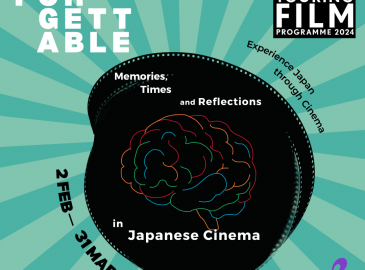
2024
Memories, Times and Reflections in Japanese Cinema
2 February to 31 March 2024
The UK’s largest festival of Japanese cinema, the Japan Foundation Touring Film Programme (JFTFP24), returns with its biggest showcase ever!
Starting off on 2 February, the programme visits 30 cities in the UK, including Oxford, Lancaster, Chichester, Liverpool and as far as Orkney, as new stopovers!
Memories play a powerful role in the mind. Shaped fluidly by individuals or time, they have been a source of inspiration for many filmmakers, fuelling their creativity to craft colourful stories. The JFTFP24 delves into Japanese cinema to explore how memories are employed in the cinematic voices of Japanese filmmakers, from films where memories are a focal point to works where they play a subliminal role in driving or affecting people’s minds and behaviour.
With an incredibly diverse range of films all based on memories, time, and reflections, this year’s programme is set to provide UK audiences with memorable stories and unforgettable moments.
Featuring guest appearances at select screenings from MAEDA Tetsu, director of Do Unto Others, CHIHARA Tetsuya, director of Ice Cream Fever, and Serena Motola, featured in Ice Cream Fever and Voices in the Wind.

For more information about these Q&A sessions, please see our News page.
The Japan Foundation Touring Film Programme 2024 has been programmed and produced by TAKEKAWA Junko (The Japan Foundation London) with assistance from IIDA Emi (The Japan Foundation London) and Emily HORST (The Japan Foundation London), together with YOSHIDA Takeshi (The Japan Foundation Tokyo) and all those from the venue partners!
Programming has been advised by NAKAZAKI Kiyomi, SEKIGUCHI Satoko and Dr Alexander JACOBY (Classics).
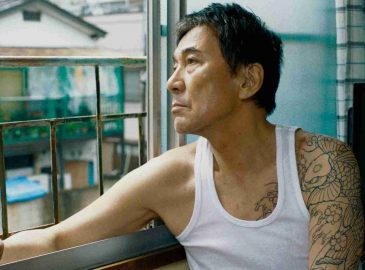
2023
Japanese Cinema Then, Now, and for the Future
3 February to 30 March 2023
The Japan Foundation Touring Film Programme, the UK’s ever-evolving largest festival of Japanese cinema celebrates its 20th anniversary!
With an exciting line up, most of which have only recently been released, but also some masterpieces from the distant past, and all of which share connections to the themes taken up in the past, the Japan Foundation Touring Film Programme 2023 explores the theme of “the evolution of Japanese cinema”. Audiences will be provided with food for thought: Where has Japanese cinema come from? What is its current position in the world of cinema? And where is it heading next?
Come and see some of Japan’s finest cinematic works, showcasing varied tones and styles, as well as the diverse skills of both experienced and emerging film talents.
The Japan Foundation Touring Film Programme 2023 is programmed and produced by Junko Takekawa (London) with assistance of Emi Iida (London), and Takeshi Yoshida (Tokyo).
Special thanks to Kiyomi Nakazaki and Eiko Meredith.
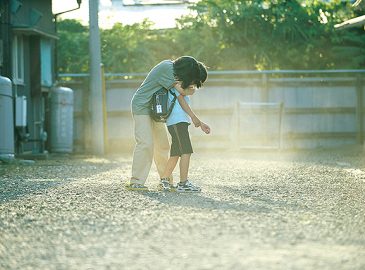
2022
The Intricate Representations of a ‘Dark Mind’ in Japanese Cinema
4 February to 30 March 2022
The UK’s largest festival of Japanese cinema is back for its 19th edition with an exciting showcase of Japanese films, most of which have only recently been released in Japan, and all of which intricately render their respective dark depths of the human mind.
So, what constitutes an unfathomable ‘dark mind’ lurking beneath the surface in modern age Japan? Would the definition of it now be more diverse when the society we are living in is more complicated than before? Does such a psychological state add to an interesting cinematic story?
From recently released contemporary works, to anime and rare classics, the Japan Foundation Touring Film Programme 2022 aims to answer these questions and demonstrate how films, seemingly different in tone and style, have the same facet running through them and that all ultimately deal in human darkness. From crime films to charming dramas, presenting an assortment of stories about people from different walks of life, this programme will showcase the cinematic voices and skills of both experienced and emerging filmmakers and aims to cater to the varied tastes of the UK audiences.
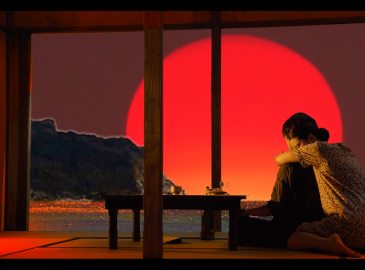
2021
Carving out a sense of existence and belonging in Japanese Cinema
(Online Special - Free to view)
19 February to 10 March 2021
For the first time ever, UK’s largest festival dedicated to Japanese cinema – the Japan Foundation Touring Film Programme – goes online in this special edition, offering screenings nationwide which will be free for this season.
What is it that people mean when they say ‘my place’; when they refer to their sense of existence and belonging?
With this question in mind, the Japan Foundation Touring Film Programme 2021 has curated 18 Japanese titles which attempt to tackle these topics in different landscapes.
From comedies to crime themes, period dramas to films centring on LGBT issues, the Japan Foundation Touring Film Programme 2021 will explore the universal and perpetual issues existing in society, with an assortment of narratives shedding light on people from different walks of life. The programme showcases voices belonging to a diverse group of filmmakers, including internationally recognised directors as well as emerging talent, all representing different styles and forms.
The Japan Foundation Touring Film Programme will offer something for everyone, wherever you may be in the UK.

2020
Joy and Despair in Japanese Cinema
31 January to 29 March 2020
The UK’s largest festival of Japanese cinema is back for its 17th edition under the concept of ‘happiness’.
Happiness, though universal in its importance, is felt so subjectively by humankind that the definition of the concept is still very elusive. And yet, the search for happiness has long provided Japanese cinema with a staple theme, and it is within its framework that the Japan Foundation Touring Film Programme 2020 has been curated.
Embracing the rich and complex spectrum of emotions that go hand in hand with this concept, the programme seeks to present the highs and lows experienced in pursuit of happiness in Japan, showcasing diverse cinematic voices as they shine a light on stories of love, social inclusion, the resilience of humankind through times of hardship, and non-conventional paths to achieving and maintaining joy.
Since 2004, the Japan Foundation has showcased, in close partnership with distinguished film venues across the nation, some of the finest Japanese films in order to introduce their versatility and uniqueness to the UK. With a line-up of contemporary titles that have never had a UK release, documentaries, anime, and classic masterpieces, there is always something for everybody.
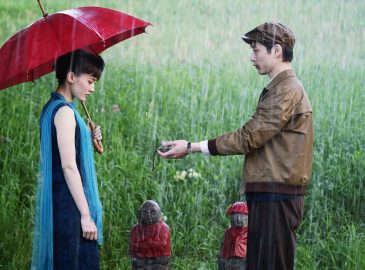
2019
Passion, Affection and Destruction in Japanese Cinema
2 February to 28 March 2019
Love, in all its semblances and dimensions, is a state so universally experienced by humankind that it has provided a perpetual source of inspiration in the long history of global cinema. Japanese cinema is no different. Love and the associated feelings of passion, affection, and destruction, in equal measure have all been channelled into a pivotal driving force behind the rise of many Japanese filmmakers, crystallising in timeless works which form part of the nation’s artistic repertoire.
The Japan Foundation Touring Film Programme 2019 features thoughtfully selected works, all focusing on this theme in one way or another. As the conventional binaries defining what it means to love continually give way to new understandings of this sweeping emotion, so too does this year’s curation aim to provide insights into a wider context of love in Japanese society.
Embracing other complicated emotions that go hand in hand with love, the programme aims to provide a more comprehensive picture of Japanese relationships, ranging from conventional love stories, LGBT issues, familial devotion, compassion for the fellow man, transgressive attractions, to profound renderings of the devastation felt with the loss of love.

2018
Secrets and Lies in Japanese Cinema
2 February to 27 March 2018
Everybody has once told a lie or kept something hidden from others. Whether for good intentions or otherwise, it is a fundamental and intriguing aspect of human nature which has provided inspiration to countless storytellers and filmmakers.
With diverse cinematic voices, The Japan Foundation Touring Film Programme 2018 features some of the best examples of cinema from Japan and will look at how the country’s filmmakers have been drawn to portraying the “(un)true” colours of human nature. The twists and turns of life portrayed in the programme are at times heart-rending, at other times hilarious, but always enthralling.

2017
Desires, Hopes and Impulses in Japanese Cinema
3 February to 28 March 2017
Taking inspiration from Charlie Chaplin’s famous quote “Life is a desire, not a meaning”, the Japan Foundation Touring Film Programme 2017 featured an all-encompassing introduction to Japanese cinema through the prism of “desires, hopes and impulses”.

2016
The Highs and Lows of Life in Japanese Cinema
5 February to 26 March 2016
Inspired by Akira Kurosawa’s iconic 1952 film Ikiru (“To Live”), the Japan Foundation Touring Film Programme 2016 looked at the way in which Japanese filmmakers have been observing and capturing people’s lives, and how people across the ages persevere, negotiate and reconcile with the environment and situation they live in.

2015
It Only Happens in the Movies?
Japanese Cinema and Encounters
30 January to 26 March 2015
This year’s Japan Foundation Touring Film Programme will provide an exciting programme of films under the narrative framework of ‘encounters’. Showcasing a vast variety of styles and tones, from popular contemporary films, classics through to animation, the programme will include titles in which characters experience seemingly unusual meetings, plunge into unexpected circumstances and new environments, as well as collide with different generations, ideals and ideas – asking the question, does it really only happen in the movies?
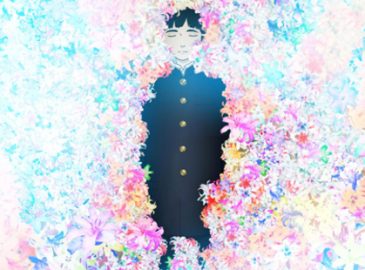
2014
Japanese Cinema Depicting the Lives of Youth
31 January to 27 March 2014
In 2014, the Japan Foundation UK annual touring film programme offered an enlightening and expansive introduction to Japanese cinema through the framework of ‘youth’. The programme took a broad look at how the adults of tomorrow have been portrayed in Japanese cinema over the years by a number of established and up-and-coming directors, through stories of individuals struggling to find a sense of meaning and identity within the world.
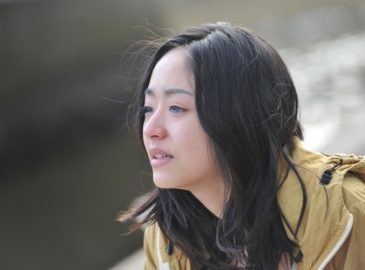
2013
Reinventing the Past Through the Eyes of Japanese Contemporary Filmmakers
1 February to 27 March 2013
Marking its 10th anniversary, the Japan Foundation Touring Film Programme in 2013 looked back into the past through the eyes of contemporary filmmakers. Touching upon a trend prevalent in recent Japanese cinema, the season showcased a series of works from directors including Takashi Miike, Sunao Katabuchi, Hirokazu Kore-eda and Isshin Inudo, who all share the same aspiration to reinterpret and relive moments of times gone by through a variety of genres, styles and tones.
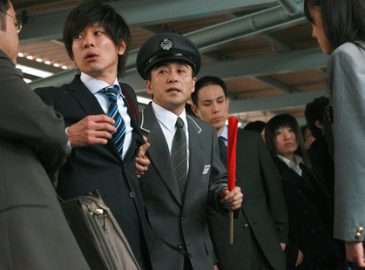
2012
Contemporary Japanese Auteurs
10 February to 28 March 2012
The ninth Japan Foundation annual touring film programme looked at narrative creativity by contemporary Japanese directors in contrast to the recent storm of adaptations, and how they express their voices through cinema. Ranging from the emerging to the established, the programme showcases directors who are not necessarily well-represented in this country, but whose works demonstrate their keen creativity.

2011
Japanese Cinema Since the Mid-90s
4 February to 28 March 2011
The 2011 Japan Foundation Touring Film Programme focussed on the marked resurgence of Japanese cinema from the mid-1990s onwards. Including established names such as Kiyoshi Kurosawa and Takashi Miike, as well as up-and-coming talent Yuya Ishii, the featured directors have carved a new path for the future and contributed to the recent success of Japanese cinema around the world. Showcasing a great breadth of creativity, the 2011 line-up offered UK audiences an insight into a pivotal period which changed the landscape of Japanese cinema and provided the industry with a new lease of life.

2010
Females in Contemporary Japanese Cinema
9 February to 21 March 2010
The 2010 Japan Foundation Touring Film Programme considered Japanese cinema made for, about, and, in some cases, by women. Women have continuously been at the centre of Japanese cinema, with notable examples being films by Kenji Mizoguchi and Mikio Naruse, and even the animated works of Hayao Miyazaki.
This programme presents works from the past few years and showcases how Japanese contemporary filmmakers, from the very established such as the late Jun Ichikawa, to young and promising filmmakers like Satoko Yokohama, approach the issues facing women. This season also includes works by female directors, reflecting the exciting trend of a marked increase in the number of female directors working in the Japanese film industry.

2009
Japanese films inspired by actual events
6 February to 19 March 2009
In 2009, The Japan Foundation Touring Film Programme looked at how Japanese filmmakers have been influenced by actual events, some of which have shaped the nation’s recent history.
Screening at five venues across the UK, the six films which date from the 1960s to 2007 are among the best produced in Japan and showcase how real-life stories have been a source of inspiration for many filmmakers in Japan and how they have interpreted and represented such events.
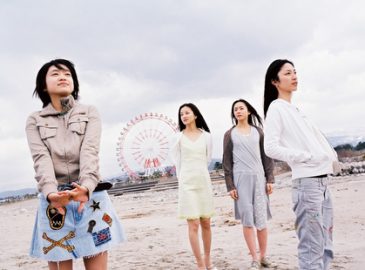
2008
A Portrait of Contemporary Japanese People on Film
9 February to 22 March 2008
In 2008 The Japan Foundation presented a touring programme of six new Japanese films. Strawberry Shortcakes portrays four young women in Tokyo; The Cat Leaves Home is the tale of two mismatched housemates; offbeat comedy No One’s Ark sees a couple leave Tokyo to follow new dreams in their home town; The Milkwoman, set in Nagasaki, is a love story spanning five decades; Kaza Hana is a deathly road trip; and comic-book adaptation Kamikaze Girls looks at fashion subculture in Japan.
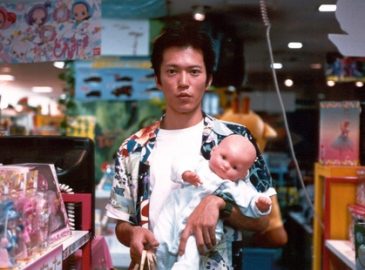
2007
Does Modern Japanese cinema have more to it than ghosts, guns and gangsters?
4 February to 29 March 2007
Since the classic names such as Ozu and Kurosawa were first introduced in the UK, the tastes and direction of Japanese cinema have shifted. Japan has also changed a great deal socially but the family is still a central concern for contemporary film-makers, providing a canvas for them to portray changes in attitudes and relationships in society.
The touring film programme in 2007 represented contemporary Japanese films all firmly rooted in the real world, and which shed light on the complexities of modern life in Japan. Widely covering genres from comedy to tragedy, drama to social criticism, these are hidden gems, guaranteed to be entertaining.

2006
Japanese Films Adapted from Manga
4 February to 28 February 2006
Not just for kids and a very significant part of the country’s subculture, Japanese comics (manga) have increasingly become a source of inspiration for Japanese filmmakers, particularly of the younger generation. The result is a new wave of cinema bursting with visual invention and exciting ideas as directors break down and reconstruct images and stories already created by artists in another medium.
The Touring Film Programme in 2006 represented a handful of examples of live-action manga, a selection which ranges widely across style and genre but which is united by a guarantee of extravagant entertainment.
2005
It was just before the last millennium that Kinema Junpo, Japan’s most prestigious film journal reflected the worldwide influence made by the American director, Quentine Tarantino and noted that a number of Japanese young film makers who emerged in to the Japanese film scene from the mid 90s, quite arguably, as “Post-Tarantino Directors”. Although their style and work are unique to each film maker, they all belong to a generation where videos were the most accessible tool for watching films and where digital technology is part of their life; they feel comfortable in sampling and remixing details of films of the past, presenting a new world of moving image.
2004
Others - Self, Identity and the Outsider in Recent Japanese Film
Aaron Gerow, an Associate Professor of Japanese Film and Culture at Yokohama National University identified a new trend in recent Japanese films, a trend that draws our attention to the concept of “others” in Japan, a term that ranges from non-Japanese to “other” Japanese. It is a trend that attempts to acknowledge inherent differences within Japanese society against a background of crisis in self and identity.
